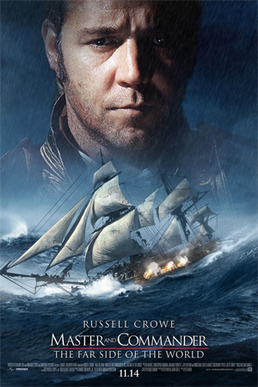Starting in 1970, British novelist Patrick O'Brian wrote 20 books in a series that's been dubbed the 'Aubrey-Maturin' series. O'Brian's books explore a very specific time -- early 19th Century as England battled Napoleon and France -- and clearly hit a nerve with audiences. You don't put out 20 books with the same characters if somebody isn't buying them, or maybe that's just my take. I tried reading one of these books when I was 10 or 11 and struggled in the early pages and never finished it. But after watching 2003's Master and Commander: The Far Side of the World, a film adaptation of O'Brian's novels, I think I'm going to give them another shot.
Adventures on the high seas have been popular in just about every form of entertainment from movies to TV to literature to stage. Some are based in truth like Mutiny on the Bounty, others are just good stories like Herman Melville's Moby Dick. Something about traveling across the vast oceans clicks with audiences, maybe the romanticism of a time gone by? Who knows for sure, but the setting is a prime choice for a jumping off point for a story in any of its forms. Even released in 2003, 'Master and Commander' has the distinct feel of a movie from Hollywood's Golden Age.
A title card sets the stage quickly, it's 1805 and the H.M.S. Surprise is off the coast of Brazil. The Surprise's Captain, Jack Aubrey (Russell Crowe), has been given orders to track down and destroy --if possible-- a French privateer, the Acheron. Encountering the Acheron in a thick fog bank, Aubrey and the Surprise are caught off guard against the bigger, faster and more powerful French ship. After a heavily one-sided victory, the Acheron sails south thinking it has delivered a crushing blow, but Aubrey will follow his orders to a T, and he's going to get his ship. If not, the Acheron may reach the Pacific Ocean where it can wreak havoc on British trade.
While director Peter Weir's movie made almost $100 million in the U.S. alone, it has been critiqued as a bit of a flop considering the $150 million budget. But box office struggles aside, this is a hidden gem for fans of historical and period pieces which come along few and far between. From the language to the wardrobe to the sets, this makes you feel like you're on the ship with Aubrey and his crew. And other than action scenes in the beginning and the end that serve as bookends, 'Commander' is all about showing what life was like aboard an early 19th century British man of war.
And with a running time of 138 minutes, Weir gets significant time to tell that story. As a viewer, we see how the crew and officers live (the officer live a little better than crew, surprised me too) as they sail around South American and Cape Horn into the vast Pacific. The conditions are brutal, death is seemingly always right around the corner in any number of ways, the food is slop, and worst of all, a French privateer seems to have the ship's number. At times, the pacing can be a little slow but never to the point where I felt like I was bored. Some parts here and there could have been trimmed some, but that's a minor complaint.
With roles in movies like Gladiator, 3:10 to Yuma, Cinderella Man, here in 'Commander' and next year in the new Robin Hood movie, Crowe has carved himself a nice little niche in the historical genre. One of my favorite actors around, Crowe always delivers a strong performance while also making his characters sympathetic. His Jack Aubrey, 'Lucky Jack' to his men, is liked and respected by his men even when forced to make the most difficult decisions. At heart, they know Aubrey will look out for them. Reuniting after working together on A Beautiful Mind, Paul Bettany is quiet, understated and almost steals the movie from Crowe as Dr. Stephen Maturin, the Surprise's highly intelligent surgeon and naturalist.
The duo have a great dynamic together, Crowe the intelligent veteran warrior and Bettany the intellectual conscience, even playing a duet together (a very moving use of Luigi Boccherini's La Musica Notturna Delle Strade Di Madrid' No. 6, Op. 30). Aubrey and Maturin are long-time friends so that dynamic is strained at times as the captain must decide what's best for his ship while the doctor looks out for the individual and the morality of the situation. With a good but not great cast behind Crowe and Bettany, these two actors dominate the screentime. Others impressing include James D'Arcy as Lt. Pulling, a young officer on the rise, and Max Pirkis as Blakeney, a teenage midshipman forced to grow up amidst a war on the high seas.
If you're a fan of older movies that were content to just be entertaining (like that's a bad thing), this movie is for you. It's a beautiful movie to look at with some great visuals of 19th century warships chasing each other across miles of ocean, and then builds to a visceral, chaotic finale. As if that wasn't enough, the ending is a bit of a cliffhanger with the above Boccherini opera used as the sountrack. A great movie all around, especially worthwhile for Crowe and Bettany's performances, this won't disappoint.
Master and Commander: The Far Side of the World <---trailer (2003): *** 1/2 /****


No comments:
Post a Comment